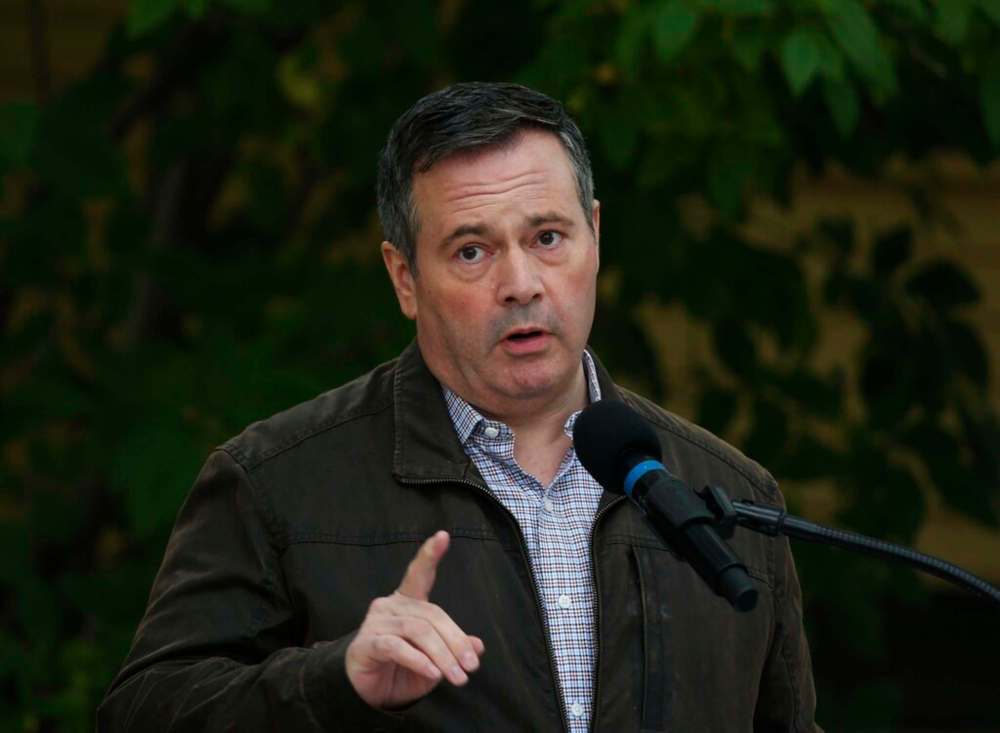Alberta inquiry into anti-energy campaigns slammed
Advertisement
Read this article for free:
or
Already have an account? Log in here »
To continue reading, please subscribe:
Monthly Digital Subscription
$0 for the first 4 weeks*
- Enjoy unlimited reading on winnipegfreepress.com
- Read the E-Edition, our digital replica newspaper
- Access News Break, our award-winning app
- Play interactive puzzles
*No charge for 4 weeks then price increases to the regular rate of $19.00 plus GST every four weeks. Offer available to new and qualified returning subscribers only. Cancel any time.
Monthly Digital Subscription
$4.75/week*
- Enjoy unlimited reading on winnipegfreepress.com
- Read the E-Edition, our digital replica newspaper
- Access News Break, our award-winning app
- Play interactive puzzles
*Billed as $19 plus GST every four weeks. Cancel any time.
To continue reading, please subscribe:
Add Free Press access to your Brandon Sun subscription for only an additional
$1 for the first 4 weeks*
*Your next subscription payment will increase by $1.00 and you will be charged $16.99 plus GST for four weeks. After four weeks, your payment will increase to $23.99 plus GST every four weeks.
Read unlimited articles for free today:
or
Already have an account? Log in here »
Hey there, time traveller!
This article was published 28/01/2021 (1740 days ago), so information in it may no longer be current.
Alberta’s public inquiry into anti-Alberta energy campaigns has been the focus of much attention over the past couple of weeks as details of the $3.5-million investigation have been made public.
In July 2019, Alberta Premier Jason Kenney and his UCP government launched the inquiry, led by Steve Allan, a Calgary accountant. Its mandate was to uncover foreign-funded campaigns against the province’s oil and gas sector, principally the oilsands.
“There’s never been a formal investigation into all aspects of the anti-Alberta campaign,” Kenney said at the inquiry’s launch.

This month, three reports commissioned by Allan were released.
The first, which was penned by University of Calgary political science professor Barry Cooper, looked at the changes to the ideology of environmental organizations. Cooper has come under fire for advocating for Alberta separation, as well as being linked to the climate-denial group Friends of Science.
Another looked at foreign-funded campaigns against Alberta’s oil and gas sector. It was written by the firm Energy In Depth, which is the creation of the Independent Petroleum Association of America.
The third report, penned by Tammy Nemeth, considers changes in progressive thinking and suggests there is a concerted movement by journalists, respected scientific organizations such as the Intergovernmental Panel on Climate Change, and others to pursue a “Great Transformation” and this is the culprit for Alberta’s oil woes. Nemeth, in her report, rejects the basic principles of climate science, despite having no standing in that field of work.
“Reinforcing this is the ongoing global propaganda campaign to demonize carbon dioxide; the Canadian government, and the U.S. Environmental Protection Agency went so far as to publicize CO2 as ‘pollution’ when it is a gas essential to all life on Earth,” the report reads.
Nemeth ties the report together by using a number of narratives based in conspiracy theories, such as American-Hungarian philanthropist George Soros having a hand in manipulating global ideals. Nemeth was paid $28,000 for the report. Little is publicly available about Nemeth’s background but CBC has reported she is a home-school teacher in England.
Allan asked University of Calgary environmental law associate professor Martin Olszynski to comment on the material generated by the inquiry.
Olszynski was highly critical.
“My general assessment is that, by and large, the commissioned reports are textbook examples of climate change denialism. All of them minimize or outright dismiss the reality and seriousness of climate change, even though none of their authors appear to be trained in climate science,” Olszynski said.
His comments were published on the U of C’s faculty of law blog earlier this month.
“We have all recently witnessed the toxic effects of conspiracy theories and alternative realities. They have no place in our democratic discourse — and even less place in a public inquiry bound by rules of administrative law,” Olszynski wrote on Twitter.
University of Alberta political scientist Jared Wesley says it seems unlikely these reports coming out now is a coincidence, suggesting Kenney would like to move the conversation away from the cancellation of U.S. permits for the Keystone XL pipeline, in which his government was heavily invested.
“Progressives will malign (the reports) and dismiss them, that’s to be expected,” Wesley said. “But even the hard right-wing folks aren’t prioritizing saving the oilsands or Keystone. Most of them are upset that (Kenney) invested in this stuff in the first place, that he’s investing in these reports instead of investing time and money in other parts of the economy.”
Most worrisome is that government-funded content pushes a narrative of “global forces” being out to get Alberta, he says.
“That kind of conspiratorial thinking tends to fuel right-wing populist — if not fascist — movements in the rest of the world,” Wesley said. “That’s the first time I’ve used the word ‘fascist’ in talking to a reporter. But I think we need to start using that language because of what we saw south of the border.”
The final report from the Alberta inquiry is due Jan. 31.
sarah.lawrynuik@freepress.mb.ca

